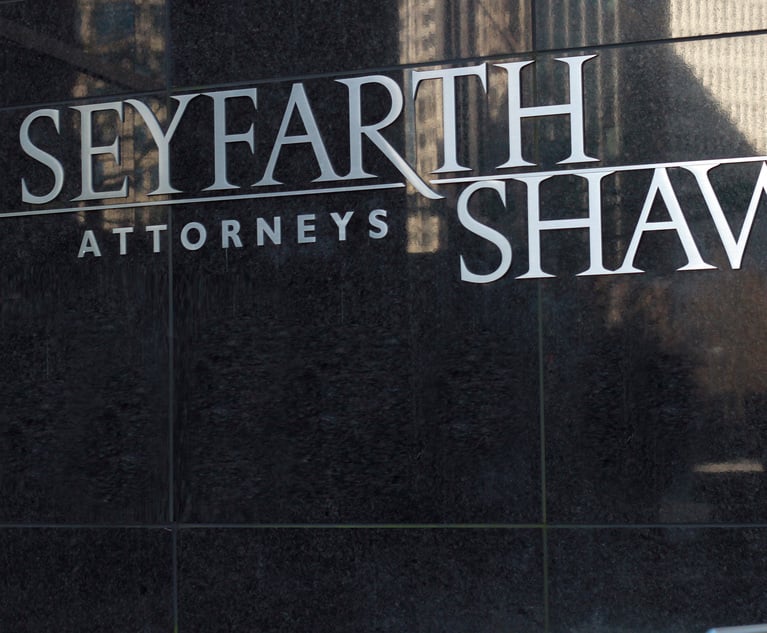 Snapchat. Photo: Shutterstock.com
Snapchat. Photo: Shutterstock.com Even With DOJ Easing Stance on Ephemeral Messaging, Compliance Hurdles Remain
When employees use ephemeral messaging apps companies still need to ensure that they document their communications, otherwise they could risk losing out on credit for cooperating with federal investigators.
April 02, 2019 at 04:50 PM
4 minute read
The original version of this story was published on Corporate Counsel
Words exchanged on ephemeral messaging apps are naturally fleeting. But companies that misuse the apps can face long-lasting consequences.
Now that the Justice Department has eased its stance on the use of ephemeral messaging apps, corporate legal departments need to ensure that employees are relying on the apps in the right scenarios and are documenting business communications that vanish into the ether.
Up until last month, companies that wanted credit for cooperating with DOJ enforcement actions under the Foreign Corrupt Practices Act essentially had to prohibit employees from using Snapchat, Telegram Messenger, Wickr and a number of other ubiquitous apps that automatically erase messages.
That changed March 8, when the DOJ issued a revised policy that lifted what had been seen as a prohibition on ephemeral apps—but with a relatively vague caveat. Companies seeking cooperation credit have to implement “appropriate guidance and controls on the use of personal communications and ephemeral messaging platforms.”
What types of guidance and controls? That's not entirely clear, according to former federal prosecutor Mitch Mitchelson, now a partner at Alston & Bird in Atlanta who represents companies facing government investigations.
He asserted that the “DOJ provided no concrete guidance on when use of ephemeral messages would be consistent with self-reporting.” But he and fellow Atlanta-based law partner Paul Monnin, also a former federal prosecutor who specializes in white-collar criminal defense, said in an interview Tuesday that there are steps companies can take to minimize risks.
First, employees should be using the apps in question only when it's necessary, such as when they're working in corrupt or hostile foreign jurisdictions and are concerned about being spied on through compromised communications networks. Companies need to have strict guidance in place regarding employees' use of ephemeral communication, otherwise the apps could be abused, which raises compliance risks.
“Let's say you're a tech company operating in China or Russia. You're in an insecure environment and take it from there,” Monnin said.
Mitchelson added, “So you communicate using an ephemeral messaging platform. But the important aspect of the deal that you're discussing needs to be recorded in some fashion. It's incumbent upon the person on the receiving end to make a memo to the file that reflects the substance of the conversation.”
The second compliance key is proper record keeping. The DOJ is not only going to want to know that the use of the app was necessary but also that the company took steps to document the communication in its records, according to Mitchelson and Monnin.
They stressed that the DOJ's revised cooperation credit policy is “forward-looking,” meaning that companies that want to benefit from the policy when a possible FCPA violation comes to light need to prepare now by counseling employees and enacting policies and procedures through risk-based analysis.
“The DOJ is going to be asking self-reported entities, 'Are you doing business in potentially corrupt jurisdictions?'” Monnin said. “And if you are, what are you telling your personnel, including your distributors and third parties, in terms of how they conduct their business and what type of digital or paper audit trail exists there?”
Read More:
This content has been archived. It is available through our partners, LexisNexis® and Bloomberg Law.
To view this content, please continue to their sites.
Not a Lexis Subscriber?
Subscribe Now
Not a Bloomberg Law Subscriber?
Subscribe Now
NOT FOR REPRINT
© 2025 ALM Global, LLC, All Rights Reserved. Request academic re-use from www.copyright.com. All other uses, submit a request to [email protected]. For more information visit Asset & Logo Licensing.
You Might Like
View All
LSAT Administrator Sues to Block AI Tutor From Using ‘Famous, Distinctive’ Test Prep Materials
3 minute read

'Biggest Influencer Scam of All Time'?: PayPal Accused of Poaching Commissions Via Its 'Honey' Browser Extension

Counterfeiters Ride Surge in Tabletop Games’ Popularity, Challenging IP Owners to Keep Up
8 minute readTrending Stories
- 1You Too Can Be a Programmer: Connecting to Legal Platform APIs With Generative AI (Part 2)
- 2Court of Appeals and Appellate Division As Courts of First Instance
- 3Federal Judge Slaps Down the SEC’s Attempt to Regulate Crypto Liquidity Providers
- 4A Client Is Guilty; But Another Man Is Wrongfully Convicted
- 5Legal Tech's Predictions for Cybersecurity in 2025
Who Got The Work
Michael G. Bongiorno, Andrew Scott Dulberg and Elizabeth E. Driscoll from Wilmer Cutler Pickering Hale and Dorr have stepped in to represent Symbotic Inc., an A.I.-enabled technology platform that focuses on increasing supply chain efficiency, and other defendants in a pending shareholder derivative lawsuit. The case, filed Oct. 2 in Massachusetts District Court by the Brown Law Firm on behalf of Stephen Austen, accuses certain officers and directors of misleading investors in regard to Symbotic's potential for margin growth by failing to disclose that the company was not equipped to timely deploy its systems or manage expenses through project delays. The case, assigned to U.S. District Judge Nathaniel M. Gorton, is 1:24-cv-12522, Austen v. Cohen et al.
Who Got The Work
Edmund Polubinski and Marie Killmond of Davis Polk & Wardwell have entered appearances for data platform software development company MongoDB and other defendants in a pending shareholder derivative lawsuit. The action, filed Oct. 7 in New York Southern District Court by the Brown Law Firm, accuses the company's directors and/or officers of falsely expressing confidence in the company’s restructuring of its sales incentive plan and downplaying the severity of decreases in its upfront commitments. The case is 1:24-cv-07594, Roy v. Ittycheria et al.
Who Got The Work
Amy O. Bruchs and Kurt F. Ellison of Michael Best & Friedrich have entered appearances for Epic Systems Corp. in a pending employment discrimination lawsuit. The suit was filed Sept. 7 in Wisconsin Western District Court by Levine Eisberner LLC and Siri & Glimstad on behalf of a project manager who claims that he was wrongfully terminated after applying for a religious exemption to the defendant's COVID-19 vaccine mandate. The case, assigned to U.S. Magistrate Judge Anita Marie Boor, is 3:24-cv-00630, Secker, Nathan v. Epic Systems Corporation.
Who Got The Work
David X. Sullivan, Thomas J. Finn and Gregory A. Hall from McCarter & English have entered appearances for Sunrun Installation Services in a pending civil rights lawsuit. The complaint was filed Sept. 4 in Connecticut District Court by attorney Robert M. Berke on behalf of former employee George Edward Steins, who was arrested and charged with employing an unregistered home improvement salesperson. The complaint alleges that had Sunrun informed the Connecticut Department of Consumer Protection that the plaintiff's employment had ended in 2017 and that he no longer held Sunrun's home improvement contractor license, he would not have been hit with charges, which were dismissed in May 2024. The case, assigned to U.S. District Judge Jeffrey A. Meyer, is 3:24-cv-01423, Steins v. Sunrun, Inc. et al.
Who Got The Work
Greenberg Traurig shareholder Joshua L. Raskin has entered an appearance for boohoo.com UK Ltd. in a pending patent infringement lawsuit. The suit, filed Sept. 3 in Texas Eastern District Court by Rozier Hardt McDonough on behalf of Alto Dynamics, asserts five patents related to an online shopping platform. The case, assigned to U.S. District Judge Rodney Gilstrap, is 2:24-cv-00719, Alto Dynamics, LLC v. boohoo.com UK Limited.
Featured Firms
Law Offices of Gary Martin Hays & Associates, P.C.
(470) 294-1674
Law Offices of Mark E. Salomone
(857) 444-6468
Smith & Hassler
(713) 739-1250






